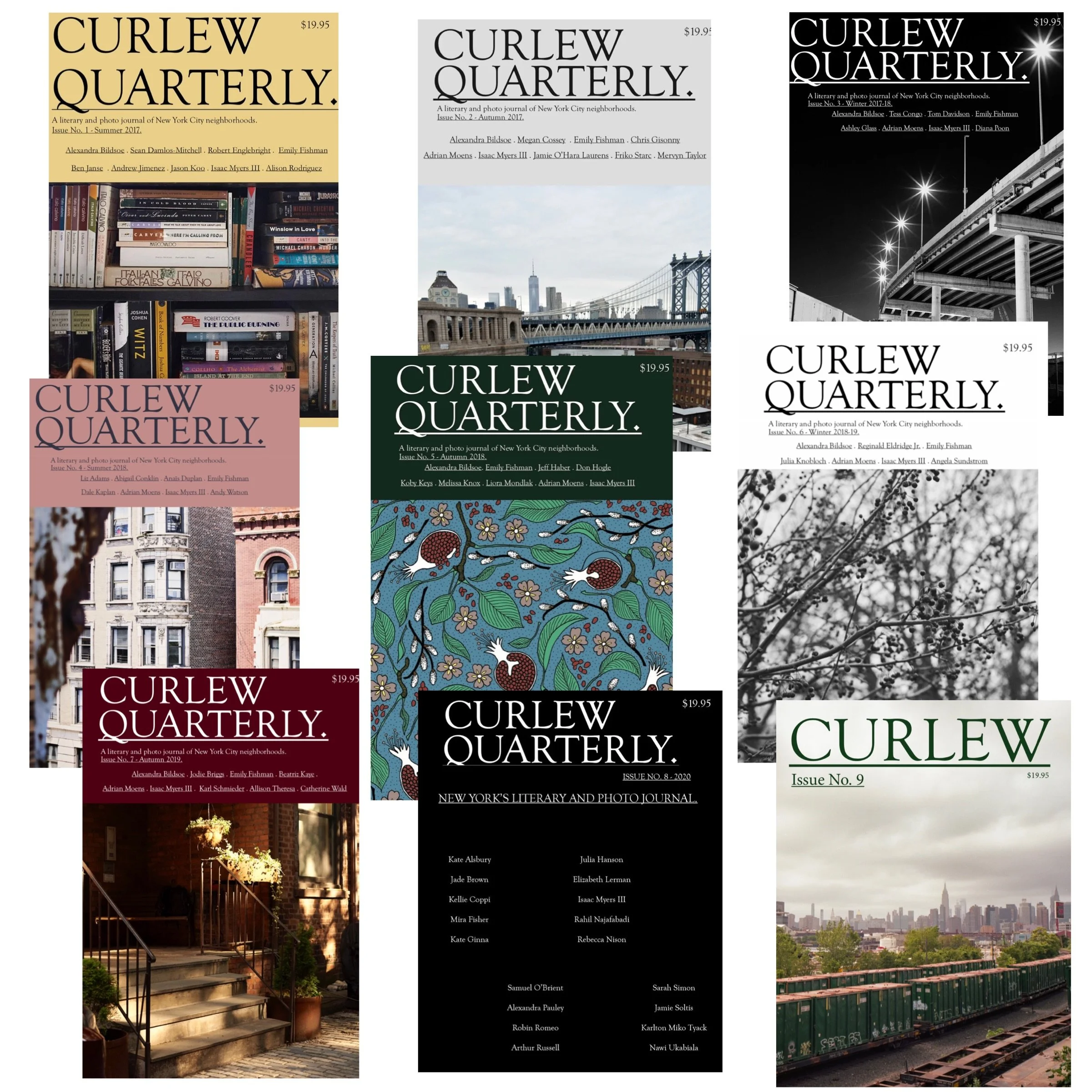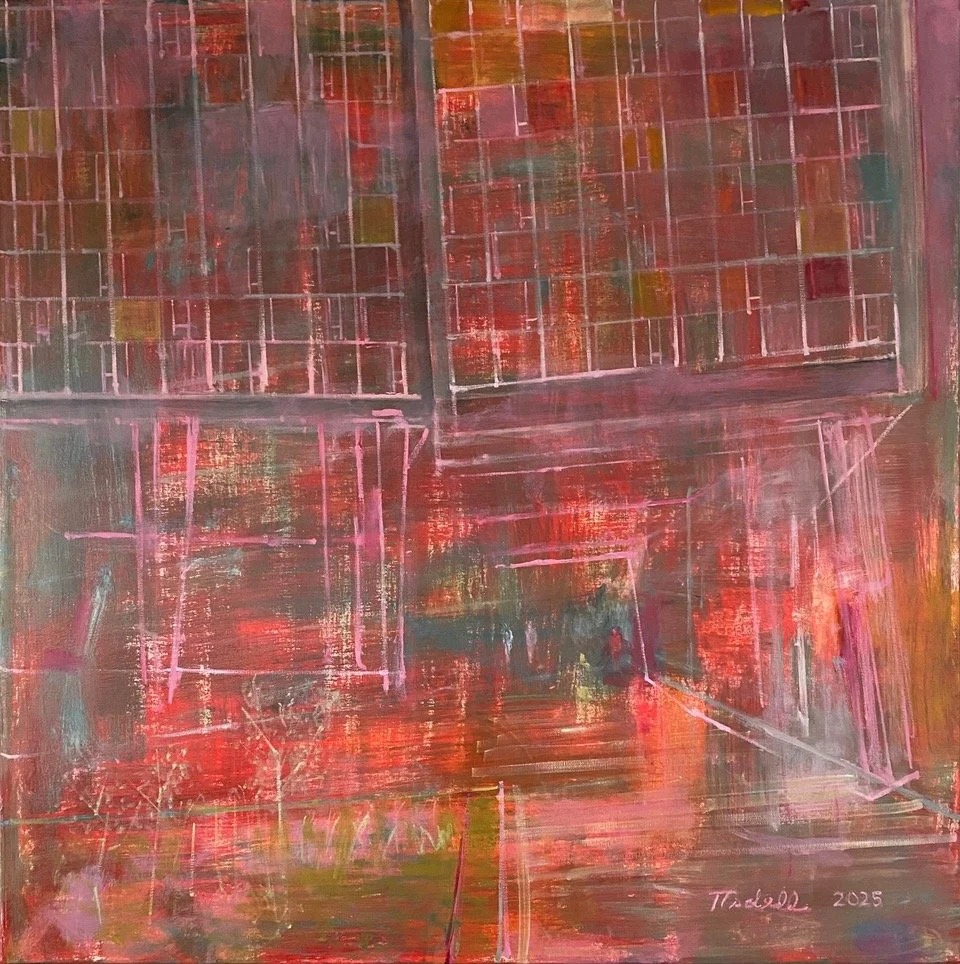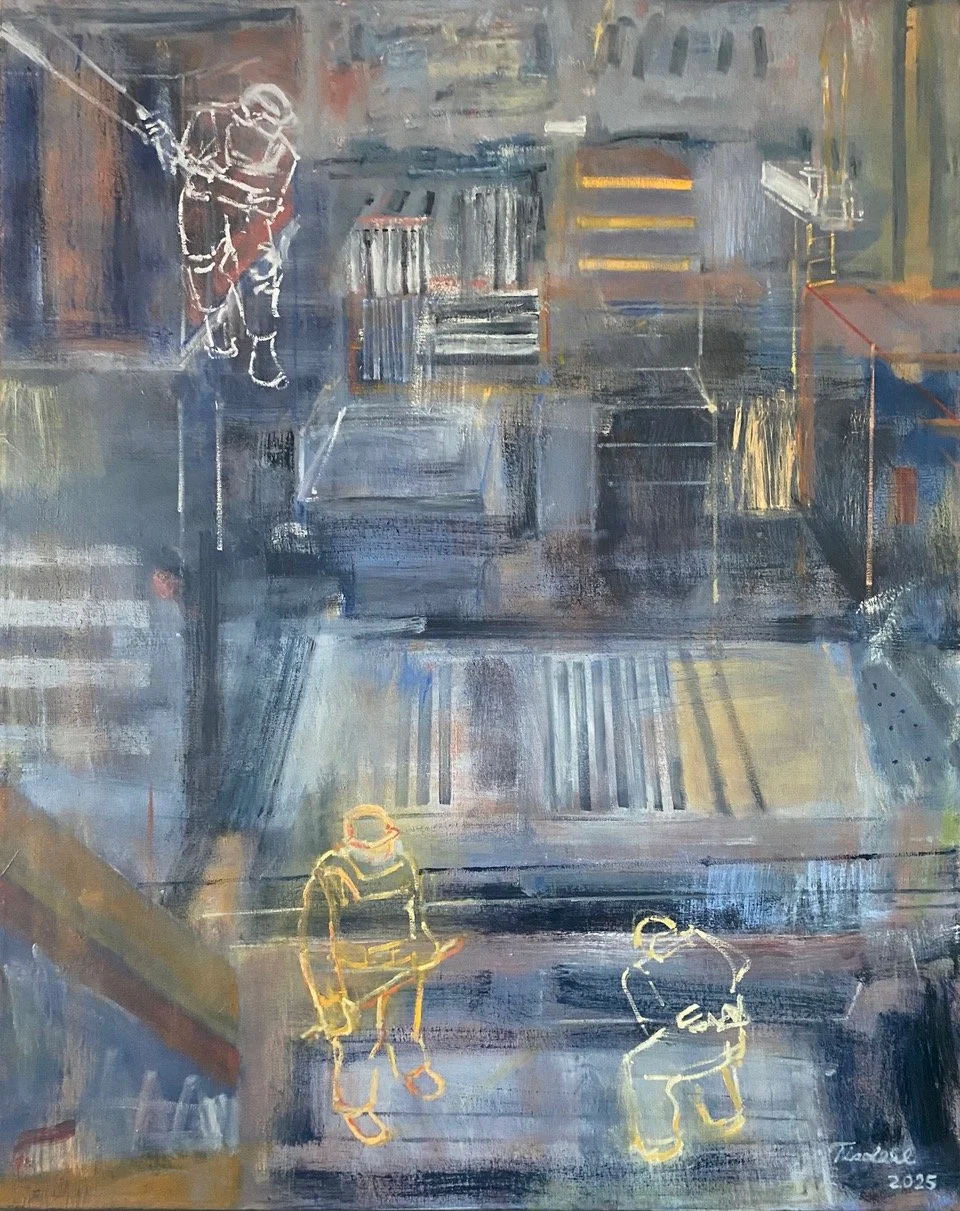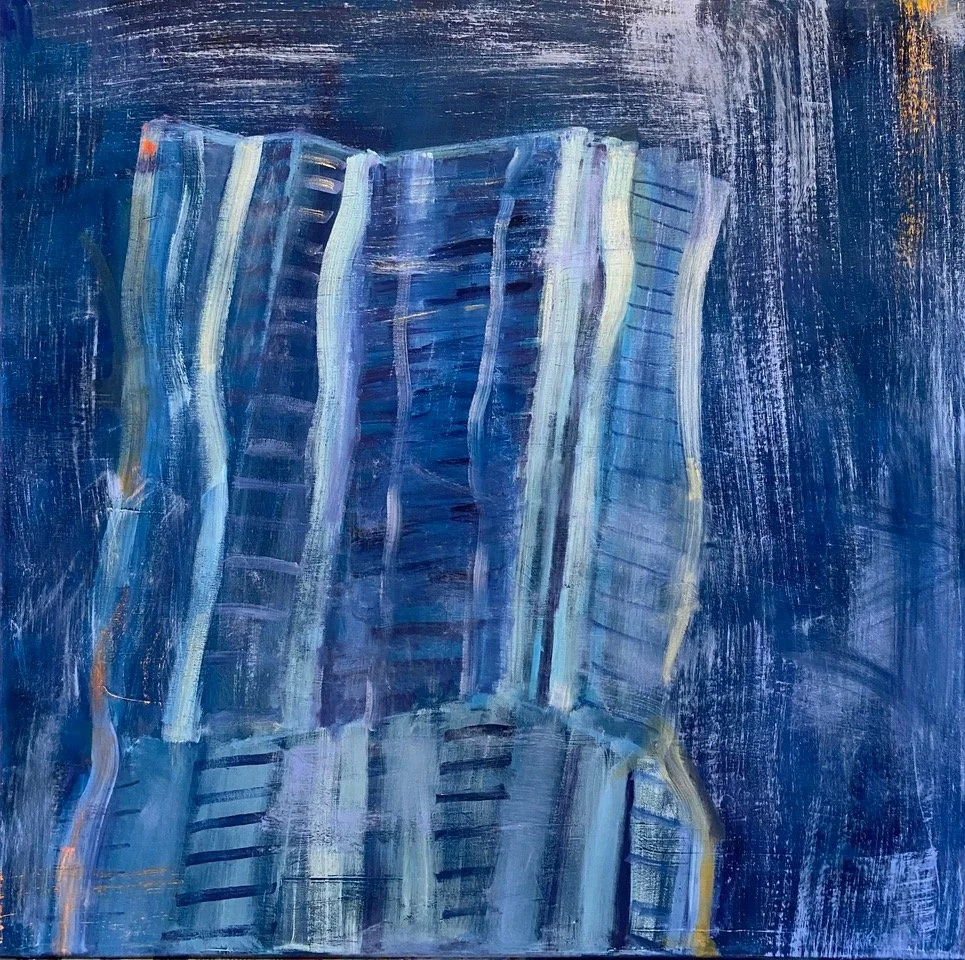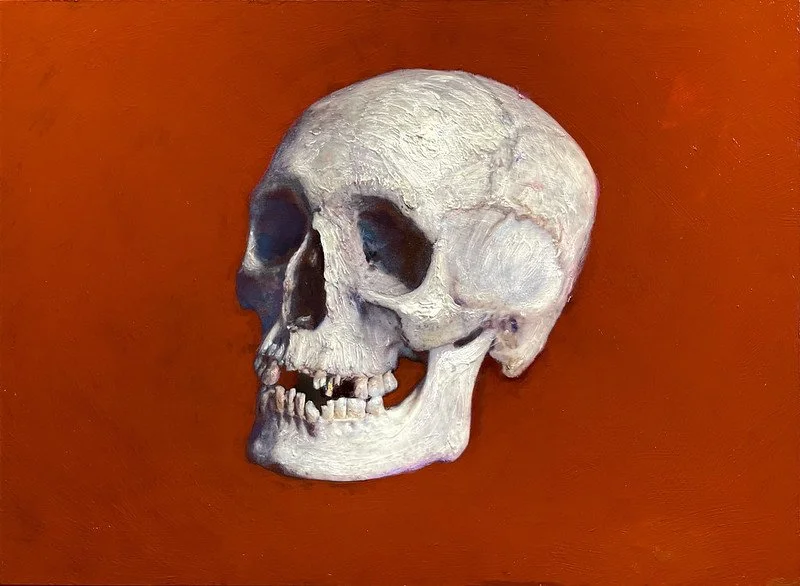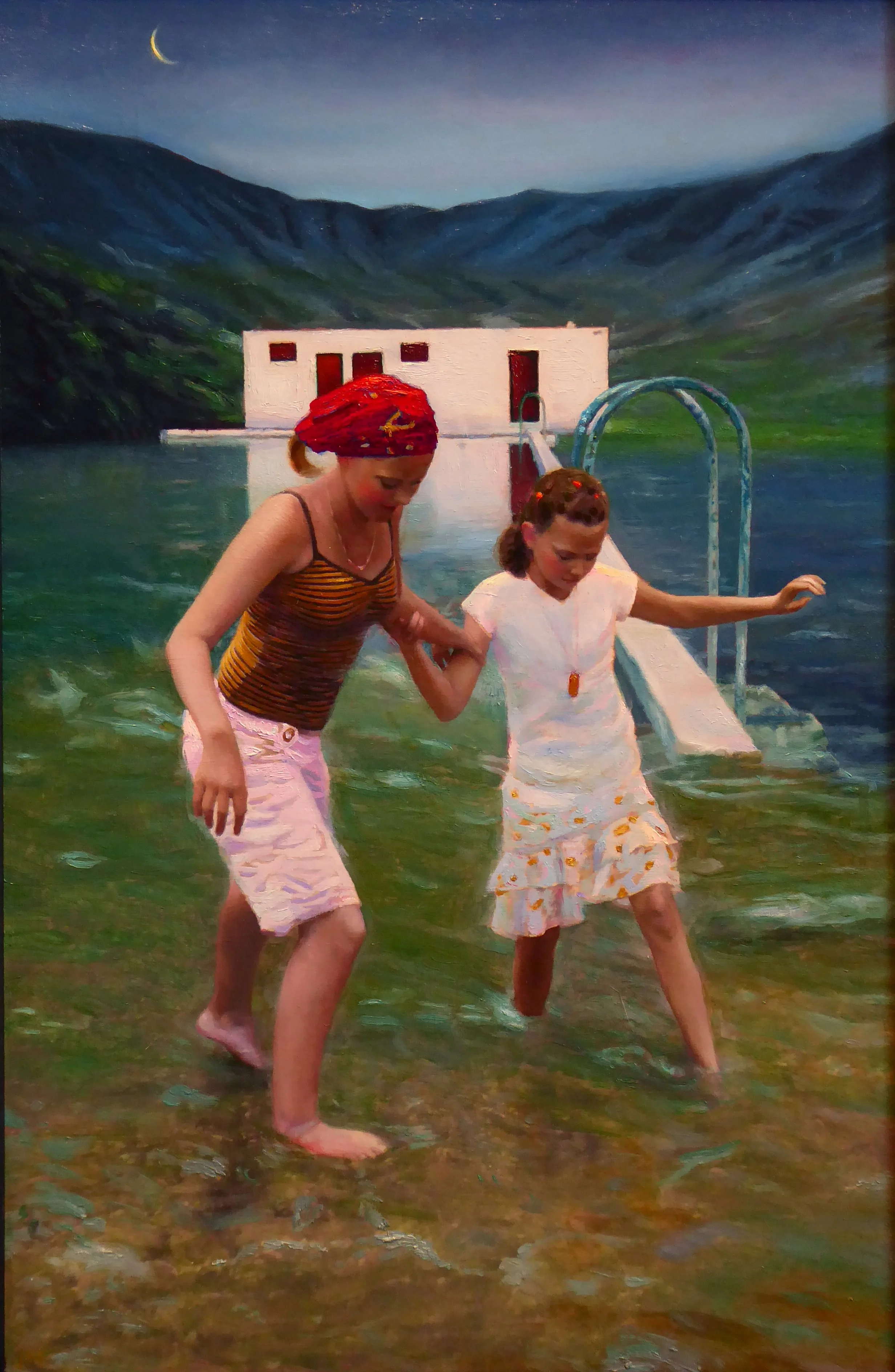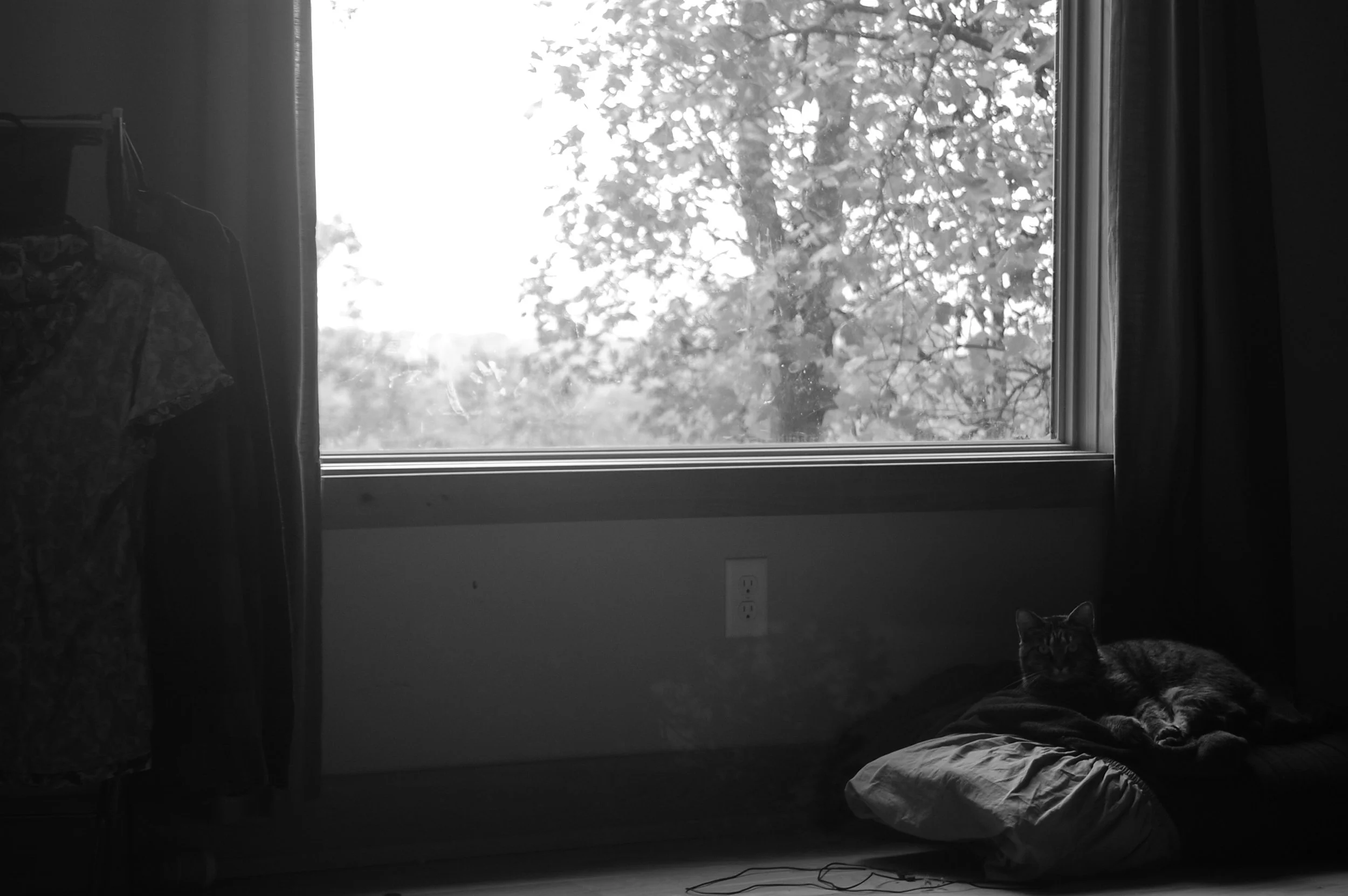December 16, 2025 - Covers of Curlew Past
Dear Readers,
As I put together the collage you look at now, in preparation for our Issue 10 cover reveal, I reflect fondly on all the amazing work Curlew New York has featured over the last (almost) decade. It is unbelievable, and yet completely believable, that nine years and nine issues have passed since Jordan, our founder, started Curlew.
It was in 2020 that I came across a fateful Craigslist call for submissions and, without overthinking it (incredibly rare for me), I sent in a piece I had just written a few weeks prior titled “Florabama”. When Jordan accepted the piece he gave me not only my first publication, but my first paid publication, and with that came a sense of legitimacy that I deeply craved. That direct link to my work, and subsequent honorarium, proved something to myself, and anyone else I thought might be watching — I was a writer.
While I will feel forever grateful to Jordan, and Curlew, for giving me that sense of validity and pride, I am happy to have a different perspective now, verging on six years later. During these years I have continued to read, write, grow, fail, succeed, laugh, cry, search and find. Less focused on proof, I feel more certain than ever of one fact — I am a writer.
It has less to do with legitimacy than it did before. Really, it has less to do with anyone but myself than it did before. I still strive for success, but success means something different now. It means being happy, it means doing something I love, it means being with people I love. I feel successful when I finish reading a book that I know will stick with me long past its last page, I feel successful when I write something I like the sound of, I feel successful when I have bursts of inspiration from the world around me, I feel successful when I challenge myself. Six years, nine years, time stretches on and all it really does is teach us.
I wrote “Florabama” in the backseat of my friend’s car while we drove through the Florida panhandle. I came back to Brooklyn after that trip and never stopped thinking about it. I loved the emerald ocean, I loved the Spanish moss, I loved the never ending roads and the dinosaurs that swam in the swamps on either side. I dreamt about it for five years, am dreaming about it still, will dream about it tonight when I go to bed, when I lay down in the room my friend made up for me in preparation for a visit that has no end date. The alligator from my dreams swims in the pond behind her house and I am here now, somewhere I already was, somewhere I knew I would be.
It feels wonderfully cyclical to be reflecting on my start with Curlew, now writing from the place that inspired the piece of writing first published by Curlew. It reminds me that time works mysteriously, that life is unpredictable in the best and worst ways and that we need to have some malleability, leniency and hope.
Any lack of consistency on Curlew’s behalf has not been for lack of passion, but maybe from lack of stability, lack of certainty, something we are still searching for and hope to gain for ourselves, our readers and for the literary community that we feel so thankful to be a part of.
With Issue 10 we celebrate another publication filled with work from passionate, talented artists. We continue to seek out words and images that move us, continue to honor our contributors and thank our readers. Our shared dedication and love of literature, the arts, and self-expression will carry us into Curlew’s next chapter – whatever that may be, wherever it may go.
– Elizabeth Lerman, Fiction & Prose Editor at Curlew New York
November 21, 2025 — “Room for One More” by Lauren Anders
I’ve never had to unlearn a face,
to memorize a new one.
To follow the line that moves along the nose
and over the eye,
whether or not it traces the eyebrow
or dips
right below.
It took me eight hours,
or eight minutes. It took me no time at all
to look at yours and want to keep it.
I watched you move,
but mostly I watched the way you stood still,
leaning forward slightly with hollow eyes
as if you were thinking deeply, or maybe not at all.
Lauren Anders is an Oklahoma native writer and visual artist. She attended the New York Academy of Art, where she received her MFA in 2018, and has since lived and worked in Brooklyn, New York. Lauren previously had work published in Soft Quarterly and VelvetPark Media, and recently completed a writing residency at the Trélex Residency in Switzerland.
November 7, 2025 — “In the Darkroom” by A. Gliss”
CW: Grooming
In the first picture of you two, the flash turns both your eyes into pools of red. His stage-makeup concealer glows white under his. You stand a head taller than him, wearing khakis and a polo because that’s what you only ever wore when you dressed nice, your style as repressed as your sexuality. Still, you think you look good. You haven’t mastered the art of smiling without squinting. His arm wraps around your waist, too low to be entirely platonic. A woody scent spills from his skin, and the first word that pops into your head is rough. But describing smells as rough doesn’t make sense, right? He is rough, though. His grip, his jaw, his eyes. He is a cage, and he’s given you the key.
“Text me the photo,” he says. Yes, yes, of course I will, of course, you say, you think, you embody, you become: a reason to talk to him.
You stare at the picture for so long that you see it even when you close your eyes.
***
The next picture is just him. “You look so old for sixteen,” he texts. “Here’s what I looked like when I was sixteen.” He’s in the backseat of a car, silhouetted by light. His hair is brushed to the side, much longer than it is now. He layers a coat over a gray sweatshirt, both too large, swallowing him. A flip phone presses against his ear, his fingers awkwardly touching the base. He smirks, his eyes staring at the camera, and you. His past sixteen-year-old self leaps across time to connect with you, and it feels close to destiny.
***
At a water park, the wave pool splashes behind you both in the picture. You had two free passes from your Mom’s work. After returning from the bathroom, he says, “Sorry I took so long. It takes a while for pee to travel down, if you know what I mean.” This is not the first time—nor the last—he wants you to know how big he is. “I’m surprised my boyfriend can take it all,” he’d say. Yes, there is it: another hurdle to your love. He has a boyfriend he met in college, whom you rarely see, since he still needs another year to graduate. When you do see him, you suppress your bubbling hatred, thinking he is the reason why you two are not together. He spends more time with me anyway, you think.
But here, in front of this wave pool with screaming children, melting ice cream dripping down sugar cones, a hot, baking sun, he provides another glimmer of hope: “Seventeen is the age of consent here. You know that, right?” You shake your head no. He wears sunglasses, so you can’t track his eyes’ movement. He might be looking at any—or every—part of you.
Waiting a year and a half might not be an issue anymore. You turn seventeen in six months.
He just turned twenty-three.
***
A full solar eclipse, the first one visible from the U.S. in decades. He asks you to come with him, traveling three hours south to the path of totality—but it’s the first day of school. You spend an hour convincing your parents to let you go, using the same logic and reasoning he gave you. You pull up a map on your phone. You use many hand gestures, marveling at how entangled yours and his language and body movements have become in this moment. You put forth everything to spend a full day, alone, with him. Before, you would have never missed the first day of school, but you love how much he’s changing you. You feel more daring. Adventurous.
Your parents say yes. They trust this man, and now, looking back, you realize how hard he worked to earn their trust. Sweet talking your mother whenever they crossed paths, filling her with compliments that she soaked up like a dry sponge.
In the picture, your solar eclipse glasses perch on your nose, and you wonder how these flimsy paper frames will protect your eyes from permanent damage. Your heads point towards the sky. Razor bumps cover his neck, his after-shave carrying that cedar scent that you will soon always, and forever, associate with him.
On the car ride back, you’re awakened by a hand on your thigh, shaking you. The touch is electric, which may be cliché, but clichés exist for a reason. “We’ll be home in ten minutes.” Ten minutes? The day went by too fast. You hate yourself for falling asleep, missing precious time with him.
***
You don’t see him for a while. Sorry I’ve been so busy, he texts. Your camera roll fills with art containing sappy quotes that resonate beyond belief:
Let’s just stop being each other’s almosts, shall we?
Before the tempest comes, I remember how we feel.
Why is love the hardest thing of all?
The movie Call Me By Your Name releases on your seventeenth birthday; it feels like a film pulled from your life, except you live in a small, Midwestern, boring town, not Italy. But still, it all resonates, spreading throughout your body like an infection.
You wish it was summer, when you hung out with him all the time. Summer is for love. For wandering outside on cool nights to escape stuffy rooms. For late, longing sunsets. For bleeding skies that rip through clouds. For sweaty sheets and moving fans. For escape. Winter is hollow, cold, empty.
You’re alone on your seventeenth birthday. Your friends ask to hangout, but you say you can’t, on the off chance he texts you.
And he does. I have a birthday present for you. You’re seventeen now. Of course, now your romance will bloom. It’s legal. How could you not have realized?
You shave, Googling how to shave parts of your body you’ve never shaved before, thinking he’ll take you then and there. You speed to his house, running at least three red lights. He opens the door, wearing sweatpants that tightly hug his legs. You sit on his dirty carpet abound with stains, not on the couch, which somehow feels more intimate.
He passes you a card. Inside it, a letter. A letter you still keep in your nightstand drawer for some reason, a relic of how much it meant to you, but now, reading it over, you laugh, you cringe, your stomach turns, and you wonder how you could’ve been so stupid. So naive. But you were a teen, after all, even if, at every opportunity, he described how mature you were.
You,
My lack of telling you how incredible you are as a young man is not due to my lack of thinking so. I write these sappy things once a year and I like to just save it for then. I wish my 17-year-old self was as put-together, respectable, and mature as you are. For what it’s worth, I’m very happy to say that I’ve played a role in that over the course of our friendship.
Yes, he did always say he’s happy to be your role model. He sensed your obvious vulnerability: a wasp ready to lay its eggs. You clung to whatever crumbs of love you could find.
In our state, 17 is a big birthday because of the legal change, so I thought I’d share some “I’m 17 now, so what’s next?” thoughts with you.
I wanted to first address the elephant in the room—you can bang whomever you like now. When I turned 17, I remember that being my first thought. I was garbage then. I’m not really worried about you. I just thought you’d be amused at some of my slutty stories. By the way, I’ll officially tell you slutty stories now.
The next paragraph is going to be my “be careful,” real-talk paragraph. The gay community can be gross and dangerous (and so can the straight community, but the culture of shame and needing to be secretive has snowballed into a sometimes scary rape culture). If a guy much older is going for you (and at this point, that means 3+ years older) then they probably have a twink fetish and are not the guys you should be spending your love and effort on. I’ve said it before but while being gay may seem lonely at times, don’t go searching for a boyfriend. You’re a fucking catch and you will find a guy and be happy—don’t worry. You are everything I wish I was at your age.
With so much love,
Him
In the picture, you hold up the space-themed card, the earth, stars, and comets scattered throughout the navy background. Only the corner of his head is in the picture. You smile wider than you have in years, so ignorant of the false happiness that has claimed you, but it’s all the same; it’s what gets you up in the morning.
He does not take you then and there, however. He says he’s tired. Has an early morning tomorrow. You leave, crying in your car, wondering how easy it’d be to drive off the side of the road. A deep emptiness nestles its way into you. You’re seventeen now. So what’s missing? What will it take to earn his love? Why does he always trap you in his web, then just leave you there, never taking a bite?
***
His “gay army,” as he calls them, gathers in a coffee shop. He met them all through theater productions, including you. You take eager sips of your chai latté, welcoming the heat it brings in this crisp fall weather. You lean forward in your chair. Everyone talks too loud, puncturing the peaceful space. People stare, sending daggers through their eyes, but no one whispers. Everyone shares their stories of him. His venom, his web, his hold, his cage, his key. A dam has shattered. Stories spew out, uncontrollable. He cheated on his boyfriend with one of them. He said he can’t wait to date one of them. He said this, and that, and that.
You share your stories. You realize you are not special. It’s freeing, in a way, but equally devastating. Thankfully, you and him were not hanging out anymore. If you were, you wonder if you would have defended him. God, you hope not, but you’re not sure, because then you would’ve felt like the chosen one; the one who survived the most rounds of some cruel, evil dating show. Either way, your eyes are open, so you can finally end this chapter, right?
There’s a selfie of everyone in the coffee shop. You’re wearing a hat since it’s early and you didn't have time to brush your bed-head. In the selfie, there are held-up peace signs, tongues stuck out, brightly colored braces, faint hints of facial hair. No one looks “mature” for their age. They look like teenagers. How teenagers should look.
Four different lives, all entangled by him.
You leave for college. He barely graces your mind. He’s from another life. Another world.
***
A pandemic sends you home from college freshman year, when freedom and expression became your normal, wearing crop tops and painting your nails with friends from your dorm floor. At home, however, you revert. You’re sent back to the cage you worked so hard to escape.
You rearrange your bedroom three times. You buy new video games. You read with a cup of tea on the back patio, burying your toes in the grass and soaking up sun. You bike twelve miles on a trail near your house, until your thighs melt and the world shuts away. And still, and still, and still, it is not enough.
It’s summer, which you now associate with danger; it’s when your longing peaks. Now you know why some say heat is suffocating. Loneliness feels even more apparent when you’re constantly outside, but there’s no one else to share this sun with.
He must sense this, somehow; a predator seeking prey. He messages you: “Are you back in town?”
Yes, you say, you embody, then try to sever.
“Let’s meet up for dinner sometime.”
You’re nineteen, with a year of college under your belt. You feel capable of seeing through his tricks, his manipulation. Yet, something pulsates, thrums from your being, still, after everything, and you hate it, but you cannot stop it.
After dinner, he says he needs to show you his new house. You drink and play Mario Party, tapping into your competitive natures. You’re tipsy. The alcohol lessens your nerves, and reality slips away, this whole scene feeling hallucinatory, or something you’re acting out in a movie.
“You can spend the night.” A pause, as if scripted. “If you want. I don’t think you should drive.”
“Yeah, sure,” you say, wondering if he planned this. You think you know where this is heading, but you’re not sure. Him and his boyfriend broke up a year ago.
It’s an old house, so the wooden stairs creak as you make your way up to his bedroom, where all the blinds are closed. A cat encircles your legs. You sneeze, since you’re allergic to cats, and the sound scares the cat away. Now, though, with the cat gone, the privacy of this space settles on your chest like a weight.
His bedroom is barren, despite its enormous size; it contains only a bed, coach, and TV. He turns the TV on, but not the overhead lights, and once more you can guess where this is going. You take a big gulp of your mixed drink, the soda sizzling down your throat. The TV plays, the light reflecting across the dark room, shadows stretching across empty walls. You’re finally getting what you want, right? What you waited for, right? What your past self craved.
“Come sit on the couch with me,” he says, tapping the cushion next to him.
There are no pictures here. Some things are better left in the darkroom, forgotten, never developed.
***
The next picture appears on your Instagram feed. He’s a high school teacher now. He’s surrounded by teenage boys for the sport he coaches, most probably the same age you were when you first met him. You stare at the photo, a knife twisting through your gut, then quickly hit the unfollow button. You pray the cycle does not continue, that it ended with you, but deep down, you know that won’t be the case.
***
Graduating from college, you find yourself lost with nowhere else to go, so you return home. You post your new job acceptance on Facebook, and, of course, of course, of course, he messages you. And still, and still, and still, you reply, but it’s simple, cordial, like when he messaged you last summer: “I saw your mom at a retirement party. Did she talk to you?” Yes, she did, passing along his message: He wants to see you.
You keep your response short once more, hoping he gets the point, hoping to keep communication short—to keep the cage closed as he dangles the key in front of you, testing how easily you may come back. But you won’t. You can’t.
You could unfriend him on Facebook: the last communication outlet between you two, but it feels too overdramatic, too petty. In reality, you know, but don’t want to admit, that you don’t want to completely sever all communication ties with him. You are entangled, after all, and severance is more difficult than you think. How often does your childhood self seeking validation crawl its way to the surface? How much hold does he still have over you? You’re not sure, and that terrifies you.
***
You’re also not sure why you write all this, in a way it feels like a confession, a cleansing. But roots that are groomed and watered dig deep. There’s no easy purge, no matter how many fires you set, how many droughts you suffer. But you’ll write this for you, me, I, us, and them—a reminder of your past whenever your poisoned mind might try to reach out to him, to be wanted, to feel when feeling becomes almost impossible in this small Midwestern town, where you want nothing more to escape to a big city with options and overflowing love, but don’t the means right now.
You just turned twenty-three, the same age he was when he met you.
Every now and then, that emptiness resurfaces. You’ve never been in a relationship, but, when love hopefully one day arrives, you’ll remind yourself it was all worth it: the buried trauma, the secrets, the shame, the hollowness. One day, you hope, it will all be worth it.
A. Gliss is an English teacher from the Midwest. When he's not reading, writing, or grading papers, you'll find him doing yoga or watching/rewatching the reality TV series Survivor. His work has appeared in The /t3mz/ Review, Samjoko Magazine, and 96th of October, among others.
October 31, 2025 — “Waiting” by Kathylynne Somerville
On the verandah of his Queenslander, he slumps under corrugated iron slats in a fold out chair. His slim torso a bending a bow into canvas with Dad painted on the back in block letters. The portable Panasonic radio chats BBC and forewarns fires, the humidity hikes in sweltering degrees, perspiration droplets bud his forehead underneath the felt brim of his Akubra hat. Over the balustrade, a family of bottle trees are militant in towering unity against waves of heat. Galahas sweep pink and grey splotches across the sky, shadowing timber peaks, winging shapes over tin, their shrills sift into white cumulus, a tarpaulin of blue. Between the latticework’s slats, he observes the wooden gate through the cream rings haunting his eyesight. He waits to hear the latch clunk, and release.
Kathylynne was reared in Australia’s down under, but moved to Los Angeles to pursue screenwriting and was fortunate enough to have a few optioned. One day, while she was writing, her mind went walking about, wandering, and she saw a sign that said: Write Poetry and Prose. Following her directions, and not forgetting her visual roots, she allows her pen to roam, penning pages of poetry, and lucky to have had several published, online and in print. At present, she is perspiring doing the hard yakka on her first novel.
October 24, 2025 — "Standard Hotel" by Cliff Tisdell
Cliff Tisdell’s art is drawn from various genres of painting, sculpture, cinema, literature and illustration. Swept in the NYC underground scene of the 1960s, he went on to attend the School of Visual Arts and the Arts Student’s League. His work is in private collections in the United States, Europe and Canada. Venues include the Edward Hopper House Museum, Carnegie Hall, Eric Fischl’s America Here and Now Project, the Chautauqua Institution, Ivan Karp’s OK Harris Gallery, and the Village Voice. Recently, his work has appeared in Blackbird VCU and Your Impossible Voice literary journal.
October 17, 2025 — "Mega City" by Cliff Tisdell
Cliff Tisdell’s art is drawn from various genres of painting, sculpture, cinema, literature and illustration. Swept in the NYC underground scene of the 1960s, he went on to attend the School of Visual Arts and the Arts Student’s League. His work is in private collections in the United States, Europe and Canada. Venues include the Edward Hopper House Museum, Carnegie Hall, Eric Fischl’s America Here and Now Project, the Chautauqua Institution, Ivan Karp’s OK Harris Gallery, and the Village Voice. Recently, his work has appeared in Blackbird VCU and Your Impossible Voice literary journal.
October 10, 2025 — "Zipper Building" by Cliff Tisdell
Cliff Tisdell’s art is drawn from various genres of painting, sculpture, cinema, literature and illustration. Swept in the NYC underground scene of the 1960s, he went on to attend the School of Visual Arts and the Arts Student’s League. His work is in private collections in the United States, Europe and Canada. Venues include the Edward Hopper House Museum, Carnegie Hall, Eric Fischl’s America Here and Now Project, the Chautauqua Institution, Ivan Karp’s OK Harris Gallery, and the Village Voice. Recently, his work has appeared in Blackbird VCU and Your Impossible Voice literary journal.
September 26, 2025 — “Fish Market, 1984” by Henry Hughes
I picked, rinsed, culled and counted rough gray oysters into red
mesh bags, tagged and hauled to the market where Freddy paid 15¢
apiece, and handed me a beer.
Freddy had the most beautiful daughter, Maya, who danced
between stinky refrigerator trucks and their smoking drivers;
around blue totes, knives, fluttering scales, slime, guts, hoses,
bloody ice in the scuzzy drain,
and put on her clean white apron, gliding behind the long glass
case, past blue claw crabs and sleeping clams, over halibut,
sturgeon, Norwegian salmon, Dover Sole, and mad-eyed mahi-
mahi, to pluck a putty-colored fillet of cheap local bluefish— 99¢ a
pound—slicing off a couple inches and feeding her black cat,
Mermaid, which the Health Department said she shouldn’t do.
It’s what she likes, Maya said. Freddy shook his head and walked
into the back. I patted the cash in my pocket and pet Mermaid,
both of us rewarded and still hungry amid the stilled and stirring
delights of the sea.
Henry Hughes grew up in Port Jefferson, New York, and he continues to maintain strong connections to Long Island and New York City. He is the editor of the recent Everyman’s anthologies, River Poems and River Stories, and the author of five collections of poetry, including Sergeant Dark, forthcoming from Lost Horse Press.
September 19, 2025 — “On the Marshy Edge” by Henry Hughes
A great blue heron
aims its gold lance.
Stab, flip and tip—
something silvery
slides to the gullet.
Car doors slam.
Startled grawk,
wings yarded,
dragon flapping
over our damp heads
on the city’s
marshy edge,
waiting for a guy
we don’t like
to get us high.
Henry Hughes grew up in Port Jefferson, New York, and he continues to maintain strong connections to Long Island and New York City. He is the editor of the recent Everyman’s anthologies, River Poems and River Stories, and the author of five collections of poetry, including Sergeant Dark, forthcoming from Lost Horse Press.
September 12, 2025 — “The Sky Flashes Pigeons” by Henry Hughes
Brooklyn, New York
During the pandemic, the boy raised pigeons
on the roof, banded the left foot of each squab,
holding them wing-cupped
to his cheek. Bright flapping flocks,
shit-spotted windows. The woman next door,
with no pets or plants, complained.
The boy’s grandpa apologized, offered to wash windows.
She slammed the door and sprinkled poison.
There were shouts, pleas, threats,
the kid crying over the feathered lump of his favorite
checkered hen. Then he pulled a pistol
from grandpa’s sock drawer.
You can see where this might go
and the awkward relief when, weeks later,
that neighbor dies. The family says Covid,
carts away boxes, the rest out with the trash.
Grandpa feels uneasy, whispers prayers to the clouds,
and throws that stupid gun off the pier.
The boy scrapes the loft and strokes
a fledgling. Police, taxis, drones, hawks,
butterflies and unmasked mothers with strollers
circle Prospect Park. The whole city
on the move again. Like a spotlight over
a crowd, the sky flashes pigeons.
Henry Hughes grew up in Port Jefferson, New York, and he continues to maintain strong connections to Long Island and New York City. He is the editor of the recent Everyman’s anthologies, River Poems and River Stories, and the author of five collections of poetry, including Sergeant Dark, forthcoming from Lost Horse Press.
September 5, 2025 — “The Storm” by Joseph A. Miller
Images of figures or figures in landscapes, in groups or in isolation, share a common feeling of significance. Wholly absorbed within themselves or the dialogue shared between one another, they wait for the unfolding of their private story.
— Joseph A. Miller
Joseph A. Miller is an Associate Professor of Art at S.U.N.Y. Buffalo State University, where he has taught drawing and painting since 1997. Miller’s work is in numerous public and private collections, and has been shown internationally in Finland, China, Poland and the Czech Republic, as well as across the United States, from Berkeley, California to Cambridge, Massachusetts.
August 29, 2025 — “Memento Mori” by Joseph A. Miller
Joseph A. Miller is an Associate Professor of Art at S.U.N.Y. Buffalo State University, where he has taught drawing and painting since 1997. Miller’s work is in numerous public and private collections, and has been shown internationally in Finland, China, Poland and the Czech Republic, as well as across the United States, from Berkeley, California to Cambridge, Massachusetts.
August 22, 2025 — “Crossing II” by Joseph A. Miller
“I focus primarily on the human figure depicted in environments that create a context for psychologically charged open ended narratives. Many of these narratives explore ideas about power and vulnerability, about enchantment and play.”
— Joseph A. Miller
Joseph A. Miller is an Associate Professor of Art at S.U.N.Y. Buffalo State University, where he has taught drawing and painting since 1997. Miller’s work is in numerous public and private collections, and has been shown internationally in Finland, China, Poland and the Czech Republic, as well as across the United States, from Berkeley, California to Cambridge, Massachusetts.
August 15, 2025 — “Passage” by Joseph A. Miller
“Quality of light is a common theme. In particular, the way in which atmospheric light and locale can suggest a sense of mystery and silence. These works are dark, humid and hopefully, at their best, memorable. For me, the most successful are those that evoke the feeling that an event is about to happen or has recently happened.”
— Joseph A. Miller
Joseph A. Miller is an Associate Professor of Art at S.U.N.Y. Buffalo State University, where he has taught drawing and painting since 1997. Miller’s work is in numerous public and private collections, and has been shown internationally in Finland, China, Poland and the Czech Republic, as well as across the United States, from Berkeley, California to Cambridge, Massachusetts.
August 8, 2025 — “Consciously Unconscious” by Priya Chouhan
Isolated by the wool of magnificent hypnosis of beauty, cold milk lukewarm in taste,
praying for the unseen optimism, coffined decently like an unused piece of cutlery in a
rusted drawer.
A gleaming array of reasoning on past choices, murky grey thoughts as I came closer,
static observation of degrading hatred, she breathes as I live.
Owns all the clothes of peculiar false artistry, draped around the sleek waist of conceit,
wounded heart, the most lovable smile, merciless lessons taught by pure evil, panting at
the door.
Long stares at the mild calmness encircling the foggy air, she froze, pale skin of dead
accountability, subtle scratches of warm affection.
Closed eyes couldn’t sleep, devastating loss of conscience, just a little closer to giving up,
heaven seems too crowded to her, life infuriatingly blushed at the gullibility of untrue
emotions, I couldn’t process the stillness, crumbling soul empathetic.
Yearning heavily for the sweet peace of perished affliction, nothing changed, who
survived is still unknown.
Isolated - - - - drawer!
I have recently completed my masters in Economics of Public Policy from Barcelona School of Economics, Barcelona (Spain) and currently preparing for my further studies. For me, poetry has been a tool to write on neglected matters. It aids me to weave the unspoken and an inexplicable contentment fills my heart when words finally reveal their beautiful meanings. My poems have been published in the following magazines/journals: Corvus Review, The Black Moon, Dreich, Brief Wilderness, Literary Yard, Littoral Magazine, The Wise Owl, Bosphorus Review of Books, Malaysian Indie Fiction, Journal of Expressive Writing, Scarlet Journal, Juste Literary, W-Poesis magazine, The Ecological Citizen, etc. - Priya Chouhan
August 1, 2025 — “Square Nights” by Miriam Bahrami
Miriam Bahrami is a photographer and charcoal sketch artist who is originally from North Carolina, and has made homes in Vermont and Spain before journeying to New York City, where she currently resides. She speaks Farsi and Spanish and aims to foster a sense of curiosity and exploration in her work, which can often feature New York herself.
July 25, 2025 — “Mia” by Miriam Bahrami
Miriam Bahrami is a photographer and charcoal sketch artist who is originally from North Carolina, and has made homes in Vermont and Spain before journeying to New York City, where she currently resides. She speaks Farsi and Spanish and aims to foster a sense of curiosity and exploration in her work, which can often feature New York herself.
July 18, 2025 — "Park [ing]" by Miriam Bahrami
Miriam Bahrami is a photographer and charcoal sketch artist who is originally from North Carolina, and has made homes in Vermont and Spain before journeying to New York City, where she currently resides. She speaks Farsi and Spanish and aims to foster a sense of curiosity and exploration in her work, which can often feature New York herself.
July 11, 2025 — “Pearls” by Miriam Bahrami
Miriam Bahrami is a photographer and charcoal sketch artist who is originally from North Carolina, and has made homes in Vermont and Spain before journeying to New York City, where she currently resides. She speaks Farsi and Spanish and aims to foster a sense of curiosity and exploration in her work, which can often feature New York herself.
July 4, 2025 — “Brother Blood” by Kushal Poddar
The brother who opens your id
and loses the key,
makes you drunk and piss
in your own yard as your wife
watches from the first floor boudoir
returns.
You know the grey. You know the why.
You know the honey
and the sting he hides.
You lower your guards in the ring,
let the blood ooze, trickle
down your chin and yet do not wipe
the corner of your mouth.
He offers your children lift
to their school,
takes them for fun instead.
Nothing sharp, not more harm
than one pale ale too many,
your wife sees a blade
whenever sun catches his glasses.
He returns. He disappears.
You know where. You know why.
Kushal Poddar, the author of 'Postmarked Quarantine' has eight books to his credit. He is a journalist, father, and the editor of 'Words Surfacing’. His works have been translated into twelve languages, published across the globe.
Twitter - https://twitter.com/Kushalpoe
